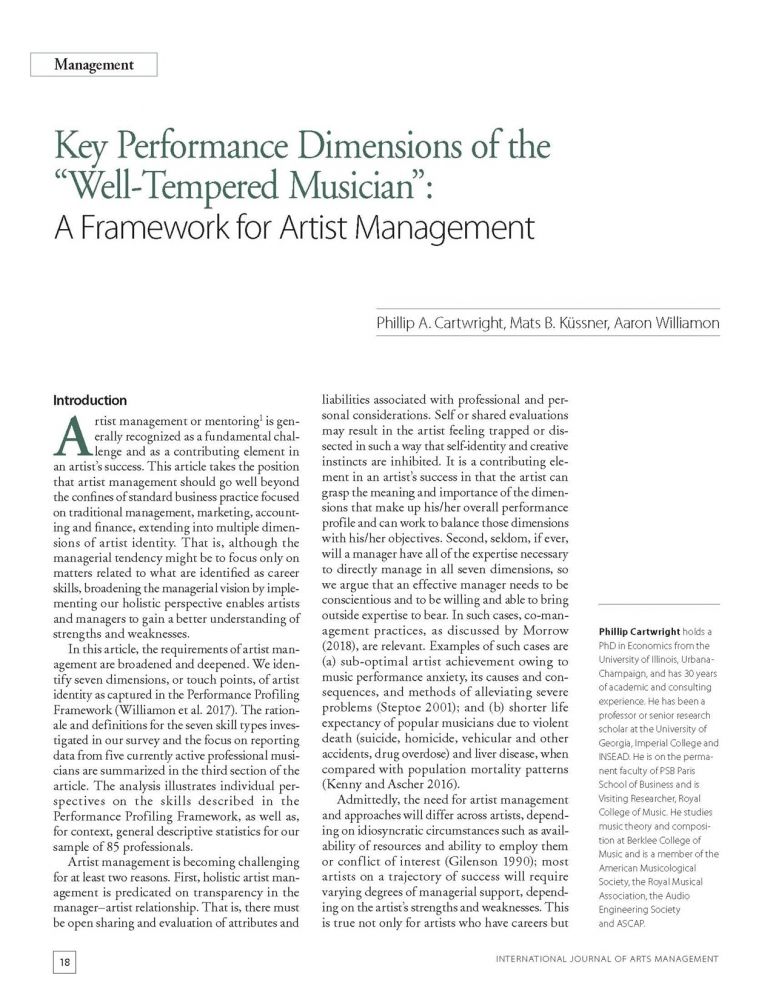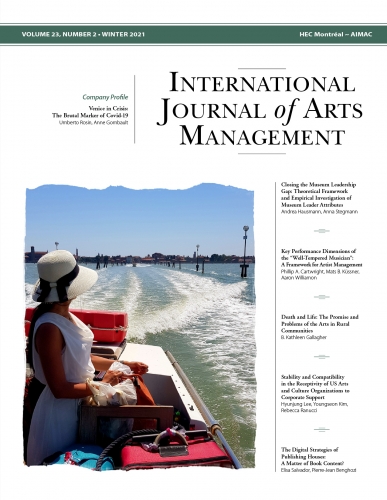Key Performance Dimensions of the “Well-Tempered Musician”: A Framework for Artist Management
Produit: Article
21,00 $ CA
Phillip A. Cartwright, Mats B. Küssner, Aaron Williamon
Phillip Cartwright holds a PhD in Economics from the University of Illinois, Urbana- Champaign, and has 30 years of academic and consulting experience. He has been a professor or senior research scholar at the University of Georgia, Imperial College and INSEAD. He is on the permanent faculty of PSB Paris School of Business and is Visiting Researcher, Royal College of Music. He studies music theory and composition at Berklee College of Music and is a member of the American Musicological Society, the Royal Musical Association, the Audio Engineering Society and ASCAP.
Mats B. Küssner is a Lecturer in the Department of Musicology and Media Studies at Humboldt University Berlin. His research focuses on multimodal perception of music, emotional responses to music, and performance science. In 2014–15 he was Peter Sowerby Research Associate in Performance Science at the Royal College of Music. He completed his PhD at the AHRC Research Centre for Musical Performance as Creative Practice at King’s College. His work is published in leading journals, including Psychology of Music.
Aaron Williamon is Professor of Performance Science at the Royal College of Music. He directs the Centre for Performance Science. His research focuses on skilled performance and applied scientific initiatives. He is founder of the International Symposium on Performance Science, chief editor of Performance Science, and a fellow of the Royal Society of Arts and the United Kingdom’s Higher Education Academy. In 2008 he was elected an Honorary Member of the Royal College of Music.
ABSTRACT
Artist management or mentoring is generally recognized as a fundamental challenge and contributing element in an artist’s success. This article takes the position that artist management should go well beyond the narrow confines of standard business practice focused on traditional business management, marketing, accounting and finance, extending into seven dimensions of artist identity. The scope of artist management is broadened and deepened. Artist management is considered more challenging, as there must be open sharing and evaluation of attributes and liabilities associated with professional and personal considerations. Further, it is unlikely that a manager has all of the expertise necessary to directly manage in all identity dimensions, so outside expertise might be imperative. Prevalent examples of such cases are sub-optimal artist achievement owing to musical performance anxiety, the causes and consequences of such anxiety, and methods of alleviating severe problems and the shortened life expectancy of popular musicians.
KEYWORDS
Artist management, artist identity, performance science, performance profiling, coaching
RÉSUMÉ
La gestion d’artistes, tout comme le mentorat d’artistes, est généralement considérée comme un grand défi et un élément essentiel du succès d’un artiste. Le présent article part du principe que la gestion d’artistes doit aller au-delà des limites étroites des pratiques commerciales habituelles – centrées sur la gestion des affaires, la mise en marché, la comptabilité et les finances – et s’étendre aux sept aspects de l’identité artistique. Sa portée s’en trouve ainsi élargie, et sa nature, approfondie. La gestion d’artistes est considérée comme un plus grand défi parce qu’elle doit impliquer un véritable partage et une évaluation sérieuse des forces et des faiblesses, de nature personnelle et professionnelle. Par ailleurs, comme il est peu vraisemblable qu’un agent d’artistes possède l’expertise nécessaire pour bien comprendre l’ensemble des aspects de l’identité d’artiste, il doit être prêt à faire appel à une expertise externe. Un exemple courant d’une telle situation est l’incapacité d’un artiste à se développer pleinement en raison d’une angoisse liée à l’interprétation musicale, la difficulté de compréhension des causes et des conséquences d’une telle angoisse et le besoin de recourir à des approches permettant d’atténuer ce grave problème, ainsi que l’espérance de vie écourtée des musiciens qui connaissent du succès.
MOTS CLÉS
Gestion d’artistes, identité d’artiste, science de la performance, profilage de performance, coaching
RESUMEN
De manera general se reconoce que la gestión, o los programas de mentoría en las artes representan un desafío fundamental y un factor contribuyente al éxito de los artistas. En este artículo se argumenta que la gestión artística debería ir mucho más allá de los estrechos confines de las prácticas empresariales habituales que se enfocan sobre la gestión comercial tradicional, el mercadeo, la contabilidad y las finanzas, para abarcar siete dimensiones de la identidad del artista. Se amplía y se profundiza el alcance de la gestión artística, considerando también que la gestión del artista representa un desafío importante ya que ha debe haber, en un contexto de apertura, un compartir y una evaluación de los atributos y riesgos asociados a consideraciones profesionales y personales. Además, es poco probable que un gestor tenga toda la pericia necesaria para manejar de manera directa todas las dimensiones de la identidad, por lo que sería imperativo recurrir a la pericia externa. Como ejemplos prevalentes de tales casos serían los logros subóptimos del artista debido a la ansiedad ante la presentación musical, las causas y consecuencias de tal ansiedad, los métodos para aliviar problemas agudos, y la esperanza de vida acortada de los músicos populares.
PALABRAS CLAVE
Gestión artística, identidad de artista, ciencia del rendimiento, categorización de prestaciones, formación

